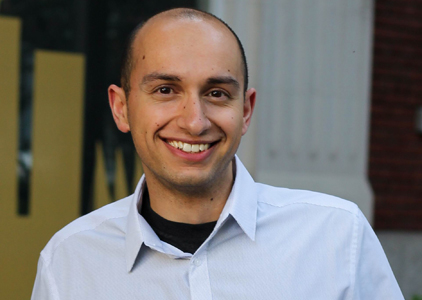8 successful study tips from the CPA CFE May 2021 Gold Medalist

Aspiring accountant Kamille Español of Calgary, Alberta shares her strategy
 |
Gevorg Grigoryan, CPA, is an accounting manager and instructor, mentor and coach to students in the CPA program. Visit Gevorg CPA to learn more and subscribe to Gevorg’s YouTube channel to access CPA program videos. |
VANCOUVER – Every aspiring accountant in the CPA program has the same 24 hours in a day to study for the Comon Final Examination (CFE). So how did a busy accountant from the demanding oil and gas industry not only make it to the national Honor Roll but attain the Gold Medal in the May 2021 CFE?
As a CPA program coach and mentor, I always look forward to interviewing successful CFE writers, and sharing their insights with students. So I recently spoke to Kamille Español, CFE May 2021 Gold Medal recipient, and broke down her CFE success formula to eight key principles.
#1: Develop a realistic study plan.
The first step in CFE prep is building a specific, measurable and realistic study plan. It can take 300 to 400 hours to prepare for the CFE, from my experience as a CPA exam coach. Kamille’s study plan looked like this:
- Before study leave: “I started part-time technical review in February until March. I would do about 15 hours each week. During this time, I wrote some cue cards and briefly read over notes from the Core and Elective modules. I also did some technical drills provided by my review programs.”
- During study leave: “I took eight weeks off to prepare and write the CFE. Starting April, I studied 8-10 hours, five days a week and take two days off (or three days if it’s a tough week). Every day, I outlined which cases I am writing and debriefing. My schedule included writing four Day 1 cases, seven Day 2 cases and twenty-five Day 3 cases.”
#2: Find your study style.
You may like taking notes on the computer or you may like annotating on printed text. Whatever method you choose, you have to be comfortable with it. Kamille did a bit of both: “I would create tables on the computer which will summarize the topic high-level. I would then print this out and hand-write extra notes on it if I learn something new during my case writing and debriefing.”
Kamille and most Honour Roll candidates I spoke with (available on YouTube) prefer printed study. Research shows that we read printed materials differently than digital, retaining more information thanks to a better cognitive-mapping. So if you’re not sure, go with printed notes.
#3: Debrief every case.
Debriefing means carefully examining and analyzing your successes and mistakes upon completion of the CPA case. It provides succinctness and summary of the simulation. Here are the debriefing steps Kamille adopted:
- Step 1: Keep an Excel tracking sheet that contains all the questions from every practice case.
- Step 2: Make note of what the issue is and how it was worded so that you recognize the trigger if it comes up again.
- Step 3: Track your marks per case, so that you know where you’re more comfortable with and where you need more effort.
- Step 4: Before writing a new case, read over your debrief notes to remind yourself what to do, or not to do.
- Step 5: After writing a case, go for a break to ensure that the case is not fresh in your mind, so that you can mark your response more fairly.
- Step 6: Go through your printed response and compare it with the marking guide.
- Step 7: After marking yourself, use the marking guide to cross out and add more notes to your response to help you get to “Competent” level.
- Step 8: After updating your response to “Competent,” go through the solution and make note of any technical weaknesses, so you can review them the next day.
#4: Know the CFE.
The format of the three-day exam can be confusing. It’s important to know the breakdown of each day and to prepare accordingly. Here’s a good guide published by Canadian Accountant to get you started.
Kamille found CFE Day 1 to be the most challenging. “There was so much information to work through. I also had a hard time figuring out what calculations they want me to do. I was so sure that if I failed, it was because of Day 1.”
On the other hand, CFE Day 3 was more manageable: “This is the Day where I just turn on auto pilot for my brain and start typing whatever comes to mind. I tend to overthink and doubt myself which is what made the longer cases of Days 1 and 2 difficult. With the time crunch for Day 3, there is no time to doubt yourself, you just go with your gut feeling.”
#5: Outline your cases.
Outlining is a tool to organize the case facts into a logical order. Kamille prepared paper outlines for Days 2 and 3, and a hybrid for Day 1, saying: “For Day 1, I just write high-level list of what the issues are. On the computer, I have a table set up for the SWOT and Pros/Cons for each alternative. As I read through, I type the case facts and pages in the appropriate sections.”
#6: Use the CPA Canada Handbook.
On the question of whether Kamille memorized the financial reporting (FR) criteria or used the CPA Canada Handbook (Handbook), Kamille responded, “I used the Handbook for every FR criteria. This freed up more memory space to remember tax rules.”
#7: Prepare for surprises.
The Board of Examiners is infamous for testing new and uncommon topics. CFE writers often find that the exam is unlike the practice cases. Kamille felt the same way. “I was not even sure if I was going to pass,” she says candidly. “I was very worried after each Day, because I found the cases were easier than all the practice cases I did. During my preparation, whenever I find a case easy, it’s bad news, because I probably just misunderstood the required [content]. I was concerned that I misunderstood what the CFE cases were asking!”
#8: Take care and take breaks.
CFE study is exhausting and it’s important that you take breaks. Kamille’s final advice to future CFE writers is to first and foremost take care of yourself. “I started preparing so early and I was putting in long hours. By May, I was burnt out and not in the right mindset to write. At that time, my marks from practice cases were going down and I could not retain anything from my technical review.
“After that, I started taking more breaks during the study days and made sure I did not do anything CPA-related on my study days off. This significantly improved my performance. I was more focused when writing a case and I was more relaxed, so I was able to retain more when reviewing. If you feel overwhelmed right now by all the cases you still have to write or topics in the competency map that you still have to learn, take a break. Take a day off from studying. You might think that you do not have much time left to prepare until the exam but you deserve and need this break.”
Conclusion
Attaining the Gold Medal is an extraordinary achievement. Remember to start by understanding the CFE and your study style. Develop a realistic study plan, outline your cases and debrief consistently. Use the Handbook during the exam and be ready for exam surprises. Take breaks, manage your stress, and take care of yourself, as you continue your journey towards becoming a chartered professional accountant.
Thank you to Kamille Español of Calgary, Alberta for sharing her knowledge and time.
Gevorg Grigoryan, CPA, is an accounting manager and instructor, mentor and coach to students in the CPA program. Visit Gevorg CPA to learn more and subscribe to Gevorg’s YouTube channel to access CPA program videos. Top image: iStock.










(0) Comments